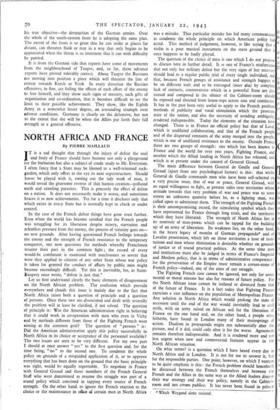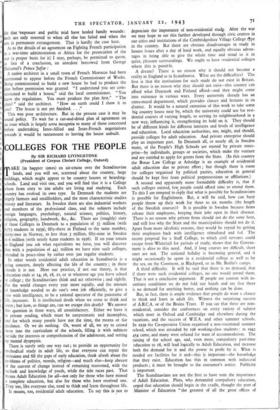NORTH AFRICA AND FRANCE
By PIERRE MAILLAUD
IT is a sad thought that through the injury of defeat the soul and body of France should have become not only a playground for the barbarian but also a subject of crude study to Mr. Everyman. I often fancy that a State may be likened to a well-trimmed rock- garden, which only offers to the eye its neat superstructure. Should havoc be played with it, rooting out the tidy work of man, it would reveal the gruesome reverse of that human creation—polluted earth and crawling parasites. This is precisely the effect of defeat on a nation. It does not necessarily make it worse, and sometimes braces it to new achievements. Yet for a time it discloses only that which exists in every State but is normally kept in check or under control.
In the case of the French defeat things have gone even further. Even when the world has become satisfied that the French people was struggling for its liberation despite misery, starvation and relentless pressure from the enemy, the process of scrutiny goes on— on new grounds. After having questioned French feelings towards the enemy and the strength of French resistance to the temporary conqueror, one now questions the methods whereby Frenchmen resume their part in the common fight ; the record of every would-be combatant is examined with touchstones so severe that were they applied to citizens of any other State whose war policy Is taken for granted the conduct of affairs by public men might become exceedingly difficult. Yet this is inevitable, for, as Saint- Exupery once wrote, "defeat is just that."
Let us first understand clearly the basic elements of disagreement on the North African problem. The confusion which prevails everywhere and clouds this issue is mainly due to the fact that North Africa raises both a question of principle and a question of persons. Once these two are dissociated and dealt with severally the problem will at least be clarified, if not solved. The question of principle is: Was the American administration right in believing that it could work in co-operation with men who even in Vichy and by methods different from those of the Fighting French were aiming at the common goal? The question of " persons " is: Did the American administration apply this policy successfully in North Africa in its choice or acceptance of the personnel available? The two issues are seen to be very different. For my own part I should at once answer " yes " to the first question and, for the time being, "no" to the second one. To condemn the whole policy on grounds of a misguided application of it, or to approve everything that has been done on the ground that the basic principle was right, would bs equally regrettable. To negotiate in France with General Giraud and those members of the French General Staff who were determined to resume the struggle was part of a sound policy which consisted in tapping every source of French strength. On the other hand, to ignore the French reaction to the choice or the maintenance in office of certain men in North Africa was a mistake. That particular mistake has led many commentators to condemn the whole principle on which American policy had acted. This method of judgement, however, is like saying that a violin is a poor musical instrument on the mere ground that it once happens to be badly played.
The question of the choice of men is one which I do not propose to discuss here in further detail. It is one of France's misfortunes that not only her military defeat but the very signs of her recovery
should lead to a regular public trial of every single individual, and that, because French groups of resistance and strength happen to
be on different soils and to be estranged (inter alia) by complete
lack of contacts, controversies which in a powerful State are dis- cussed and composed in the silence of the Cabinet-room should
be exposed and shouted from house-tops across seas and continents.
It has in the past been very useful to apply to the French problem methods of publicity and vocal stimulation which the prostrate state of the nation, and also the necessity of avoiding ambiguity, rendered indispensable. Today the elements of the situation have changed. There is in France no official policy but that of Laval, which is undiluted collaboration, and that of the French people and of the dispersed remnants of the army merged into the people. which is one of undiluted resistance to the enemy. Outside France
there are two groups of strength: one which has been known to France and the world for over two years, Fighting France, and another which the Allied landing in North Africa has released, and which is at present under the control of General Giraud.
The main difference between General de Gaulle and General Giraud (apart from any psychological factors) is this: that whilst
General de Gaulle commands men who have been self-selected on a very precise issue, that of war or peace, General Giraud, with an equal willingness to fight, at present rules over territories whose
attitude towards that very problem of war and peace was to some
extent an unknown quantity before he, as a fighting man, was called upon to administer them. The strength of the Fighting French is their uncompromising record, the stimulating symbol which they have represented for France through long trials, and the territories which they have liberated. The strength of North Africa lies in
its reservoir of man-power which can be tapped for the building
up of an army of liberation. Its weakness lies, on the other hand. in the heavy legacy of months of German propaganda* and of Lavalist penetration, which left on those territories a host of insti- tutions and men whose elimination is desirable whether on grounds of justice or of sound practical politics. At the same time men and institutions must also be judged in terms of France's Imperial and Moslem policy, that is in terms of administrative competence: for the preservation of the Empire must remain a corner-stone of French policy—indeed, one of the aims of our struggle.
The Fighting French case cannot be ignored, not only for senti- mental or moral reasons but also for reasons of future policy. For the North African issue cannot be isolated or divorced from that of the future of France. It is a fact today that Fighting France exercises a vast influence on the population of Metropolitan France.
Any solution in North Africa which would prolong the state of secession until the end of the war would inevitably lead to civil strife, with an army raised on African soil for the liberation of France on the one hand and, on the other hand, a people who, hitherto, have found in London many of their mainsprings of action. Dualism in propaganda might not substantially alter the picture, and if it did, could only alter it for the worse. Agreement remains therefore indispensable. And it is rendered more and not less urgent when new and controversial features appear in the North African situation.
On what terms? is a question which I have heard every day in North Africa and in London. It is not for me to answer it, but
for the responsible parties. One point, however, on which I venture
to be quite emphatic is this: the French problem should henceforth be discussed between the French themselves and between the
French and the Allies in the same way as the Allied leaders discuss their war strategy and their war policy, namely in the Cabine 1- room and not coram publico. It has never been found in private * Which Weygand alone resisted.
e that 'exposure and public trial have healed family wounds: th are only resorted to when all else has failed and when the aim is permanent estrangement. That is hardly the case here.
As to the details of an agreement on Fighting French participation in a war-time administration of Africa for the prosecution of the war (a proper basis for it) I may, perhaps, be permitted to quote, n lieu of a conclusion, an anecdote borrowed from George Duhamel's Prince Pear : A native architect in a small town of French Morocco had been summoned to appear before the French Commissioner of Works. Being commissioned to build a new house he had to produce the plan before permission was granted "I understand you are com- missioned to build a house," said the local commissioner. " You know the regulations. You must produce the plan first." " The plan? " said the architect. "How on earth could I show it to you? The house is not yet finished. . . ."
This was poor architecture. But in the present case it may be sound policy. To wait for a cut-and-dried plan of agreement on an issue which is largely terra incognita to many of those concerned before undertaking Inter-Allied and Inter-French negotiations towards it would be tantamount to leaving the house unbuilt.



























 Previous page
Previous page